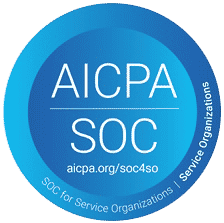The labor laws on breaks at work can be challenging to keep up with. Many states have several different labor laws guiding employers on meal and rest breaks in the workplace, while federal labor laws dictate which breaks should be paid or unpaid. Failing to comply with these laws can lead employers to break compliance laws, resulting in costly fines or penalties.
In this article, we take a look at the federal and state labor laws for work breaks.
Federal Break Compliance Laws in the U.S.
While an employer is not required to provide a meal or rest breaks, if they do offer breaks shorter than 20 minutes, they are considered part of working hours and are therefore paid. This means that 15-minute breaks are required to be paid according to federal law if an employer decides to provide them.
If a break is 30 minutes or more, they can be unpaid. During these longer breaks, employees must be free of all work duties and use the time they want. Breaks under 20 minutes are considered rest breaks, while breaks 30 minutes or longer are considered meal breaks.
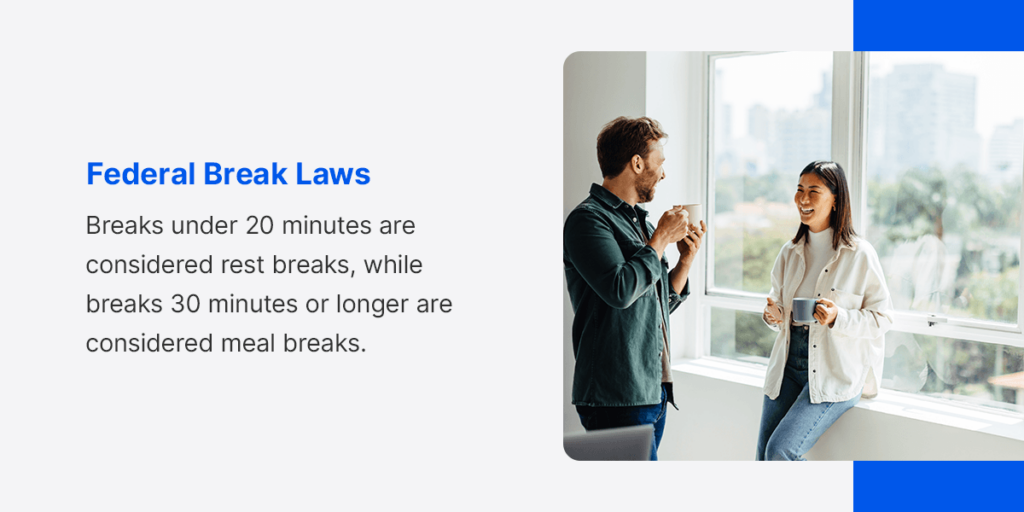
Further, some meal and other work break laws only apply to non-exempt employees according to The Fair Labor Standards Act (FLSA). Non-exempt employees earn an hourly federal or state minimum wage when working 40 hours or more weekly. They are also entitled to overtime pay or compensation for additional hours worked. Exempt employees are guaranteed monthly or yearly salaries, regardless of their work hours. They don’t receive overtime or compensation for any extra hours worked.
Meal and Rest Break Laws By State
There are 32 states with break and rest laws. Some of them have explicit regulations that define breaks for all employees. Some states only have rules that dictate breaks and rests for minors or specific industries. Employers must follow federal labor laws for non-exempt employees that fall outside those guidelines. To ensure they remain in line with break compliance laws, employers must carefully navigate both federal and state regulations.
Below is a summary of the rest and meal break laws by state:
Break Laws in Alabama
Employers only need to provide a half-hour meal break to employees under 16 if they work more than 5 continuous hours.
Break Laws in Alaska
In Alaska, employees must provide a half-hour break to employees aged 14 to 17 if they work 6 hours or more. The break must take place after the first hour-and-a-half or before the start of the last work hour. If a minor works for 5 hours without a break, they must take a 30-minute rest before returning to work.
Break Laws in Arkansas
Labor laws in Arkansas only require breaks for children under 16 in the entertainment industry.
Break Laws in California
California labor laws state that employees should get a half-hour to take a meal break when working 5 hours in a row. Employees who work over 10 hours a day are entitled to a second meal break. The first meal break should occur before the start of the sixth work hour. The second break should take place before the end of hour 10.
These breaks are counted towards hours worked unless employees have no work duties and can freely leave their station or the premises. They should be paid according to hourly rates. Employers are only allowed to provide “on-duty” meal breaks if workers cannot be relieved of all work and with a written agreement between employer and employee. Employees are allowed to take a 10-minute paid rest break when working 4 hours. A rest break is usually not required for employees who work less than 3.5 hours daily.
Break Laws in Colorado
Workers are entitled to a meal break of 30 minutes when working for five consecutive hours. During this break, the employee must be free from all work-related duties. The break may be unpaid. Employees who cannot take a break without work must take an “on-duty” break and be compensated for the time. Both employers and employees must agree upon this.
Employees in these industries must take a 10-minute rest break every 4 hours worked. The break should be in the middle of the shift.
Break Laws in Connecticut
In Connecticut, employees are entitled to a half-hour meal break if they work 7.5 hours or more. The break must be given after the first 2 work hours and before the last two work hours. These breaks can be unpaid. The federal rule applies to all other employees.
Break Laws in Delaware
Employees in Delaware get a 30-minute meal break if they work 7.5 hours or longer. This break can be unpaid and should take place after the first 2 hours of work but before the last 2 hours. Workers under 18 must be given a 30-minute non-work period when they work 5 consecutive hours.
Break Laws in Florida
30-minute meal breaks are granted to employees under 18 who work 4 or more hours in one shift.
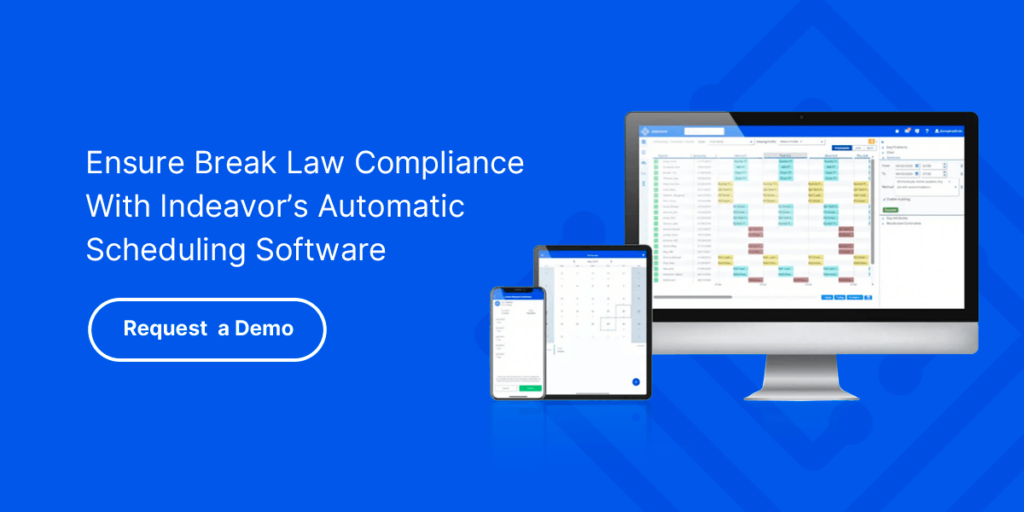
Break Laws in Hawaii
Employees under 16 must get half-hour breaks when working 5 or more hours.
Break Laws in Illinois
Twenty-minute rest breaks are granted to employees who work 7.5 or more hours in a shift. It can be unpaid and should be given before the sixth hour of the shift.
Break Laws in Indiana
Workers under the age of 18 must get 30-minute meal breaks when they work 6 straight hours. This can be one break or split into two separate ones equating to 30 minutes total.
Break Laws in Kentucky
Employees must get a paid 10-minute rest period for every 4 hours worked. Workers are also entitled to a reasonable meal period during a shift. It should be after the first 3 work hours but before the sixth hour. The law doesn’t state how long meal breaks need to be. It can also be unpaid. Employees under 18 must take a half-hour meal break when working 5 or more hours.
Break Laws in Louisiana
Employers are required to give employees under the age of 18 a 30-minute meal break when working 5 or more hours. The break can be unpaid as long as the employee is free from work responsibilities.
Break Laws in Maine
Employees should be allowed to take a 30-minute unpaid meal break when working 6 hours in a row if there are three or more people on shift. Additional breaks can be negotiated as long as it is in writing and both parties agree. Breaks are paid if they are 20 minutes or less.
Break Laws in Maryland
Minors under 18 get a break for at least 30 minutes when working 5 or more hours in a shift. The Healthy Retail Employee Act states only specific retail employers must give workers breaks. The break length and frequency are based on shift length.
Employees who work more than 6 hours in a shift are entitled to a 30-minute meal break. If workers agree to work through their break, they are to get paid for their time.
Break Laws in Minnesota
Employers must provide employees with sufficient bathroom breaks and time to eat for employees who work 4 hours in a row. Employees working 8 or more hours in a shift should also be given time to eat a meal, usually 30 minutes. Breaks under 20 minutes are paid.
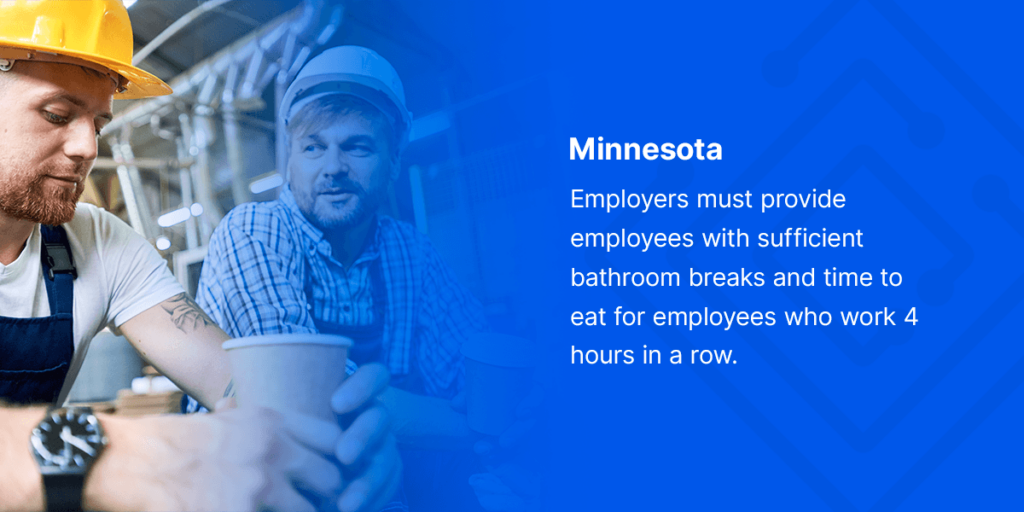
Break Laws in Nebraska
For every 8-hour shift, employees in workshops, assembly plants, and other mechanical establishments work, they are entitled to a 30-minute lunch period.
Break Laws in Nevada
Employees are entitled to a 30-minute meal break for every 8 hours of consecutive work. They are also allowed a 10-minute rest for every 4 hours worked.
Break Laws in New Hampshire
The law requires an unpaid 30-minute meal break for every 5 hours worked. If it is impossible to grant the time, employees must be paid if they need to eat and work.
Break Laws in New York
Different industries in New York have different meal and break requirements. Mercantile and other establishments must allow employees a half-hour break for lunch. Employees who work longer than 6 hours a day over the lunch period are allowed a 30-minute lunch break at noon. Employees get an extra 20-minute meal period if their shift starts at 11 a.m. and finishes after 7 p.m.
Employees who work shifts longer than 6 hours and start between 1 p.m. and 6 a.m. must get a 45-minute break midway through their shift. Factory employees and health attendants may have different rules. In situations where shorter breaks are needed, they must be agreed upon in writing and posted at the workplace entrance.
Break Laws in North Carolina
Employees under 16 must be given a 30-minute meal break when working 5 or more hours in a shift.
Break Laws in North Dakota
Employees who work 5 or more hours in a shift must get a 30-minute meal period when two or more people are working a shift. It can be unpaid if the employee doesn’t work during that time.
Break Laws in Oklahoma
Employers must give minors under the age of 16 a 30-minute meal break when they work 5 hours or more in a shift. Employees under 16 must get a total rest period of 1 hour if they work 8 consecutive hours.
Break Laws in Oregon
Employees who work between 6 and 8 hours are entitled to a 30-minute unpaid break. The break should be uninterrupted and the employee must be relieved of all work responsibilities. If the shift is 7 hours or less, meal breaks should be taken before the fifth hour and after the second. Meal breaks should be taken between the third and sixth hours if the shift is longer than 7 hours.
All employees are also allowed a paid 10-minute rest period for every 4 hours worked. Minors get a 15-minute paid rest period every 4 hours. Workers should get a second meal period if the shift is 14 hours or longer.
Break Laws in Tennessee
The meal break law in Tennessee requires employers to give employees a 30-minute rest or meal period when working 6 or more hours. The break cannot be taken within the first work hour.
Break Laws in Pennsylvania
Employers are required to give minors under 18 a 30-minute rest period when working shifts 5 hours or longer. The break can be unpaid if the employee is exempt from all work during that time.
Break Laws in Utah
Minors under 18 are entitled to a meal break of at least 30 minutes within 5 hours of starting work. They are also allowed a 10-minute rest break every 4 hours. Minors cannot work for more than 3 hours without a 10-minute rest break.
Break Laws in Rhode Island
All employees must get a 20-minute rest break when working a 6-hour shift. Staff who work 8 hours or more must get a 30-minute meal period. The breaks can be unpaid only if the employee is free of all work responsibilities. The meal law only applies if at least five employees are on the shift. Employers don’t have to provide meal breaks if fewer than three people are on a shift.
Break Laws in Washington
Employees are entitled to a 10-minute rest break every 4 hours they work. The break should be in the middle of the work period, and employees aren’t allowed to work more than 3 hours without taking a rest break. Employees who work more than 5 hours in a shift are entitled to a 30-minute food break. Meal breaks should be given between the second and fifth hour of work.
The break may be unpaid if workers are relieved of all work duties. Meals breaks must be paid if:
-
- Employees are required to be on duty, even if they don’t get called in.
-
- Workers are called back to duty when they aren’t usually on call during their meal break.
Break Laws in West Virginia
Workers are entitled to a 20-minute meal break when working 6 or more hours in a shift. If employees can eat while working or take breaks as needed, this 20-minute break is not required. Meal breaks are unpaid if workers are free of work duties during this time. Workers must be paid for the break if they eat while working.
Break Laws in Wisconsin
Minors under 18 who work more than 8 hours in a row must get a 30-minute meal break.
States Without Break Laws
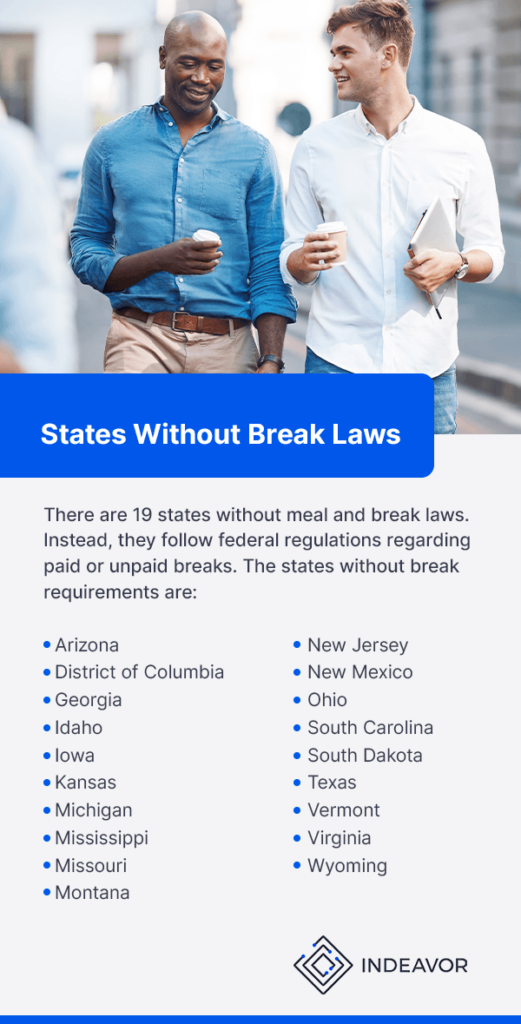
There are 19 states without meal and break laws. Instead, they follow federal regulations regarding paid or unpaid breaks. The states without break requirements are:
- Arizona
- District of Columbia
- Georgia
- Idaho
- Iowa
- Kansas
- Michigan
- Mississippi
- Missouri
- Montana
- New Jersey
- New Mexico
- Ohio
- South Carolina
- South Dakota
- Texas
- Vermont
- Virginia
- Wyoming
Other Factors Affecting Break Laws
Labor or worker unions can also impact the amount and length of breaks permitted to employees. Unions may leverage collective bargaining to ensure employees are granted additional work breaks in accordance with break compliance laws. They can also work to ensure they are paid or unpaid. Further, some industries may require employees to be on call at all times. In these instances, workers may have to eat while working and get paid for the time.
Any changes to the provision of break periods must get the written approval of both employees and employers, in order to adhere to break compliance laws.
Ensure Break Compliance Laws are Followed
With so many meal and rest break rules, ensuring your workplace complies with all the regulations can be time-consuming. Indeavor’s automated scheduling software can make scheduling rest and meal breaks easy. Our scheduling software is purpose-built for creating employee schedules that comply with state and federal regulations. Our intelligent algorithms simplify scheduling, even in complex workforces with locations in different states.
Our team will work with you to understand your unique scheduling needs and can have your scheduling system set up in less than three months. Book a demo or give us a call today to learn how Indeavor’s software scheduling technology can help you manage employee breaks!





